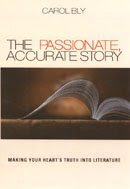
Vivian Gornick talks about “the situation and the story”—the two elements of good prose. What happens and why it happens. Because of her simplicity in describing this complex idea, The Situation and the Story became one of the truly influential writing books in my life.
Carol Bly’s The Passionate, Accurate Writer taught me about writing of consequence and how to stay unembittered while working with difficult material. Kenneth Atchity’s innovative book-gathering ideas in A Writer’s Time transformed the last five manuscripts I completed and published.
For years, I whole-heartedly recommended these three books to my writing buddies, coaching clients, and students. I know there are many very good writing books available—and shelves of them line my office—but only a few, such as these, have really taught me how to grow as a writer.
A friend’s discovery recently added another transformative writing book to my small collection. From Where You Dream, by Robert Owen Butler (Grove/Atlantic, Inc., 2005) is a series of lectures to his graduate fiction students, transcribed and edited by Janet Burroway (of Writing Fiction fame).
Although geared toward fiction writers, From Where You Dream answered my question on how to bring out the deeper meaning of any piece of writing, especially when writing a book.
Carol Bly’s The Passionate, Accurate Writer taught me about writing of consequence and how to stay unembittered while working with difficult material. Kenneth Atchity’s innovative book-gathering ideas in A Writer’s Time transformed the last five manuscripts I completed and published.

For years, I whole-heartedly recommended these three books to my writing buddies, coaching clients, and students. I know there are many very good writing books available—and shelves of them line my office—but only a few, such as these, have really taught me how to grow as a writer.
A friend’s discovery recently added another transformative writing book to my small collection. From Where You Dream, by Robert Owen Butler (Grove/Atlantic, Inc., 2005) is a series of lectures to his graduate fiction students, transcribed and edited by Janet Burroway (of Writing Fiction fame).
Although geared toward fiction writers, From Where You Dream answered my question on how to bring out the deeper meaning of any piece of writing, especially when writing a book.




 Here are some questions to think about, as you work on your writing and your book this week:
Here are some questions to think about, as you work on your writing and your book this week:






